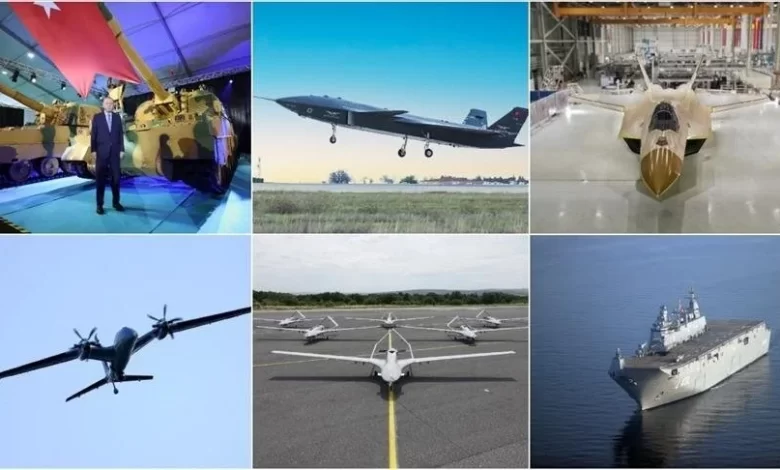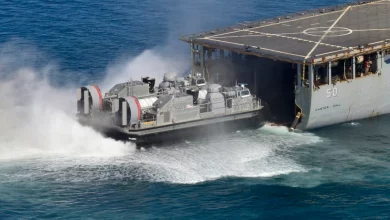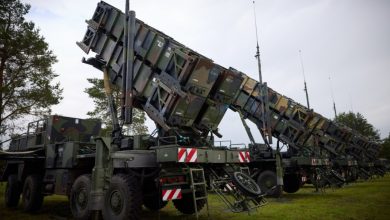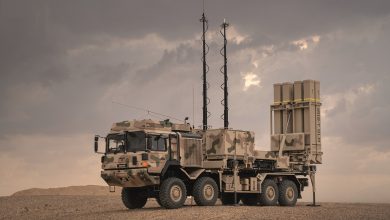Analysis: Türkiye’s defense industry has come a long way

Today, almost every single person in Türkiye deeply believes in the importance of having an indigenous defense sector
Türkiye has built a vigor defense sector over the last 20 years and that defense sector enabled Turkiye to pursue its goals in its region. In 2022 Türkiye’s arms export hit a record of $4.4 billion which was almost $100 million in the 2000s. Ismail Demir, the head of Türkiye’s Defense Industries Presidency declared their goal for 2023 to reach $6 billion. According to Turkish Defense and Aerospace Manufacturers Association (SaSaD), Türkiye is home to some 1,500 companies in the defense sector. No doubt, the defense industry of Türkiye has a strong historical background.
Historical background
Actually, the Turkish defense industry dates back to the 15th century which is known as Tophane-i Humayun, the Imperial Cannon Foundry. Under the umbrella of Imperial Cannon Foundry, the Empire’s capacity for manufacturing the needs of the Army and Navy was far beyond its contemporaries. After the industrial revolution of the 1800s, the Imperial Defense Industry struggled to pace up with technological developments for almost 200 years. In 1921 General Directorate of Military Factories was founded and in 1924 small weapons and cannon repair shops and cartridge factories were established in Ankara. In 1925 Türkiye’s first private sector investor for defense was Şakir Zümre in İstanbul. One year after, Tayyare ve Motor Türk A.Ş (Airplane and Engine Turk Co.) was opened. In the 1930s the Nuri Killigil pistol, mortar, and ammunition production facilities in Istanbul were also in use.
With the start of World War II, the changing nature of the world order also affected Türkiye and all of its defense industry. Türkiye has opted for acting together with the West and US. By the end of World War II, the Marshall Plan fully furnished the Turkish Armed Forces with the surplus weaponry of war in light of the US aid program. These aid programs had a huge negative impact on Türkiye’s defense industry, still, Türkiye has got the advantage of walking together with the West in the bipolar world. The Letter of Johnson and the embargo applied to Türkiye between 1975-1978 and the CAATSA sanctions applied by the US affected Turkish public opinion deeply. Today, almost every single person in Türkiye deeply believes in the importance of having an indigenous defense sector.
Paradigm shift for defense industry
The Under-secretariat of Defense Industry (SSM) was formed in 1985 in order to transform the defense industry which was an isolated part in Türkiye. SSM was formed in 1985 in order to transform the defense industry which was an isolated part in Türkiye. Due to the changes from parliamentarian democracy to the presidential government system, SSM was transformed into the Presidency of Defense Industry (SSB) in 2018. SSB is a core institution of Türkiye’s defense strategy and technology which is not limited to defense. It is not an exaggeration to stress that the real change for the defense industry has started with SSM which pulled the private sector to the defense industry with a civilian mind. Although building a robust defense industry had always been prioritized in programs by the governments and political leaders it was only during the presidency of Recep Tayyip Erdogan that concrete steps have been taken in these fields. In the early 2000s, Erdogan’s government outlined a self-sustaining strategy for the defense industry and pushed the private sector to invest in the indigenous defense industry.
What do the numbers say about that success?
Ismail Demir has many times stressed that while 20 years ago, only 62 defense projects were carried out in Türkiye, this number has reached 800 today. More than half of these projects have been launched in the last 6 years. Demir said, ”While defense projects with a budget of $5.5 billion were carried out 20 years ago, the current project volume exceeds $70 billion, with the trend continuing to rise.” Today, Türkiye is supplying defense-related equipment to almost 100 different countries including the US, Poland, United Kingdom, Hungary, Latvia, Lithuania, Saudi Arabia, Bosnia-Herzegovina, Serbia, Slovakia, Uruguay, and Albania. Türkiye has also grabbed a very important niche for robotic systems. Although Türkiye is well known for its drone power and technology, it made progress in much for all robotic systems not only for aerial vehicles but also for land and sea.
Facts at a glance at Turkish defense industry
According to Demir, the $1 billion of defense and aviation turnover of 2002 has reached $11 billion per year as of the time of this writing. Defense and aviation exports which were only $248 million in 2002, exceeded $3 billion by 2019. Over the same period, the number of Turkish defense companies has increased from 56 to 1,500 today. The total number of personnel working in the sector has reached approximately 75,000. While only 66 defense projects were carried out in 2002, today the number of projects has increased more than 10 times and reached to 700. Approximately 350 new projects have been initiated between 2015 and 2020. Türkiye’s defense projects were carried out in 2002 with a budget of approximately $5.5 billion. Today, as of 2020 the project volume reached $70 billion with an increase of approximately 11 times. Considering the projects are still in the bidding process, it is predicted that a figure of over $75 billion will soon be reached. In the same period, such strong support has been provided to research and development that it has become an autonomous field on its own. In 2002, research and development expenditure was nearly $50 million.
The effects of Turkish defense industry on Turkish foreign policy
No doubt Türkiye has adopted an assertive foreign policy by increasing its military presence beyond its borders. Turkish-made, 5th-generation complicated defense products have changed the status quo in South Caucasus, Libya, and Ukraine. Sales of weapons and technologies, especially drones have helped Türkiye to improve ties internationally, in particular with states such as Azerbaijan, Libya, Morocco, Malaysia, Romania, Poland, Kazakhstan, Kyrgyzstan, Uzbekistan, and Turkmenistan. Still, there is significant demand from all over the world to combat proven Turkish defense industrial products which also paves the road to a new level of bilateral relations. Haluk Bayraktar, CEO of Baykar Co., said at SAHA EXPO that “Defense industry exports are not only an economic activity but also a very strong diplomatic leverage. We see its contribution to the country’s efforts.” Türkiye’s fight against terrorism has also gained huge success not only at the intra-state level but also at the extra-state level. Behind this success, there are without doubt highly developed defense products such as unmanned aerial vehicles.
Source: AA





